As a holistic veterinarian, I enjoy answering pet owners’ questions about how to keep their furry friends healthy and happy. One frequent inquiry is whether there are safe over-the-counter substitutes to Quadruple ointment for skin and ear issues in dogs. I understand the desire to provide quick relief to your pet without the need to visit a veterinarian. That’s why I’m happy to help! I’ll recommend some of the best over-the-counter alternatives to Quadruple ointment that can help your dog feel better in no time. Let’s get your pup on the road to recovery!
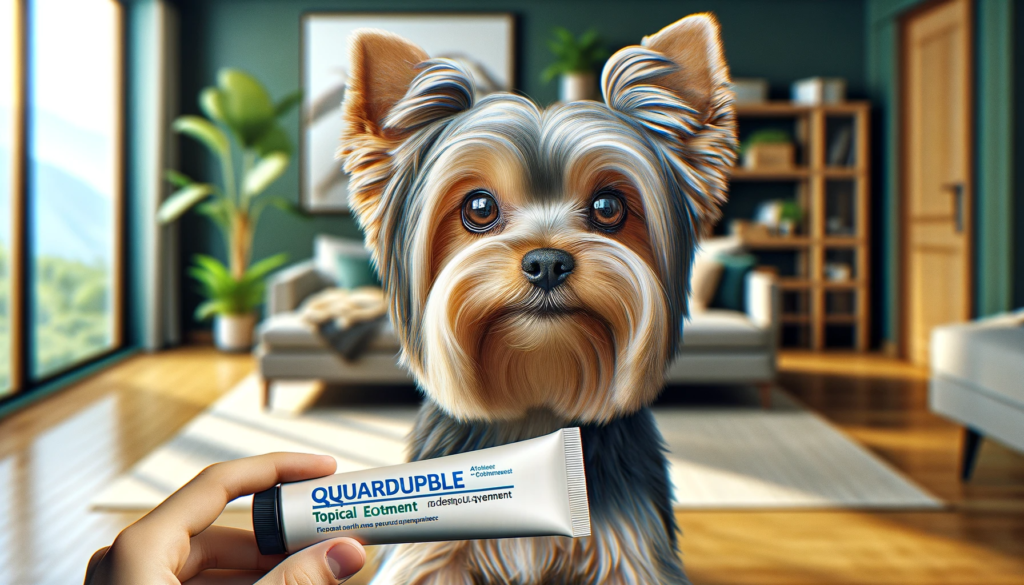
Best Quadruple Alternative For Dog Ears
Zymox Otic 1.0% Hydrocortisone
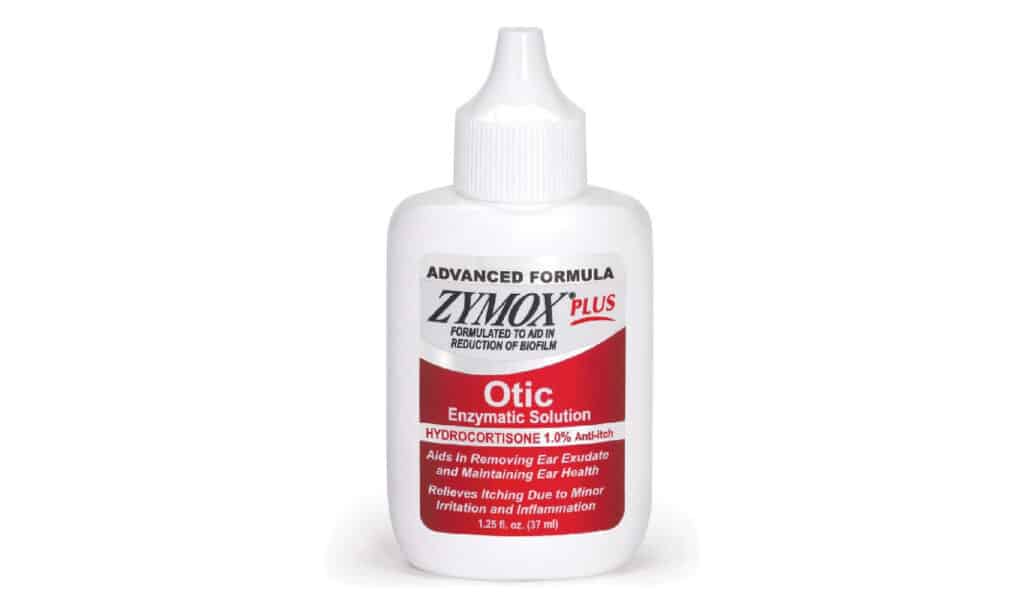
Zymox Plus Advanced Formula is a topical enzymatic solution designed to treat bacterial, fungal, and yeast infections in dogs and cats.
Best Quadruple Alternative For Dog Skin
Zymox Topical Cream Inflammation Relief Hydrocortisone 1.0% for Dogs & Cats
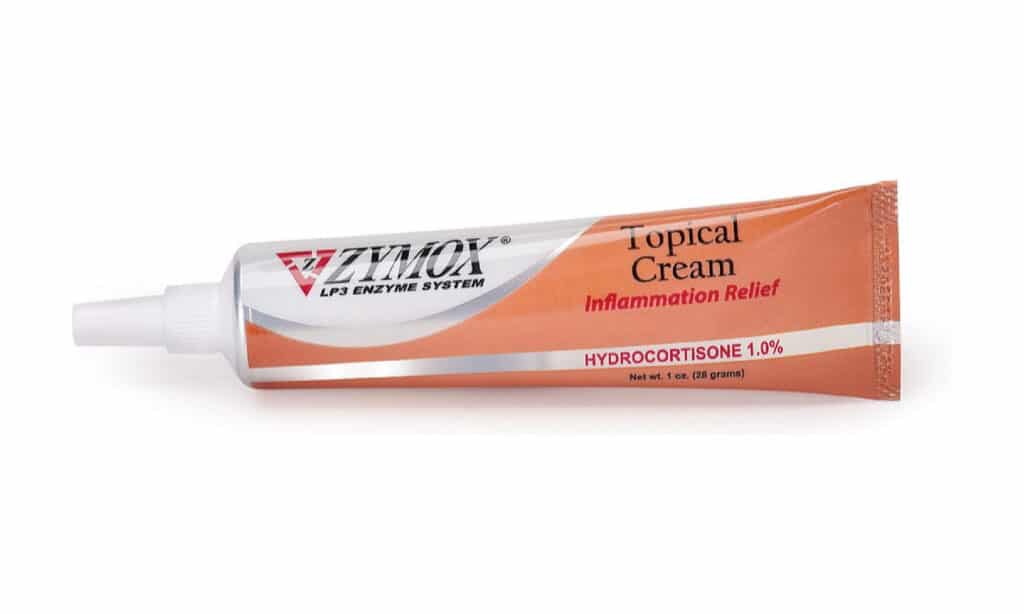
Zymox Topical Cream for Inflammation is a pet-friendly product that helps to soothe and relieve skin irritations and infections.
Best Quadruple Alternative For Hot Spots
Healers Hot Spot Relief Hydrocortisone Dog & Cat Ointment, 4-oz bottle
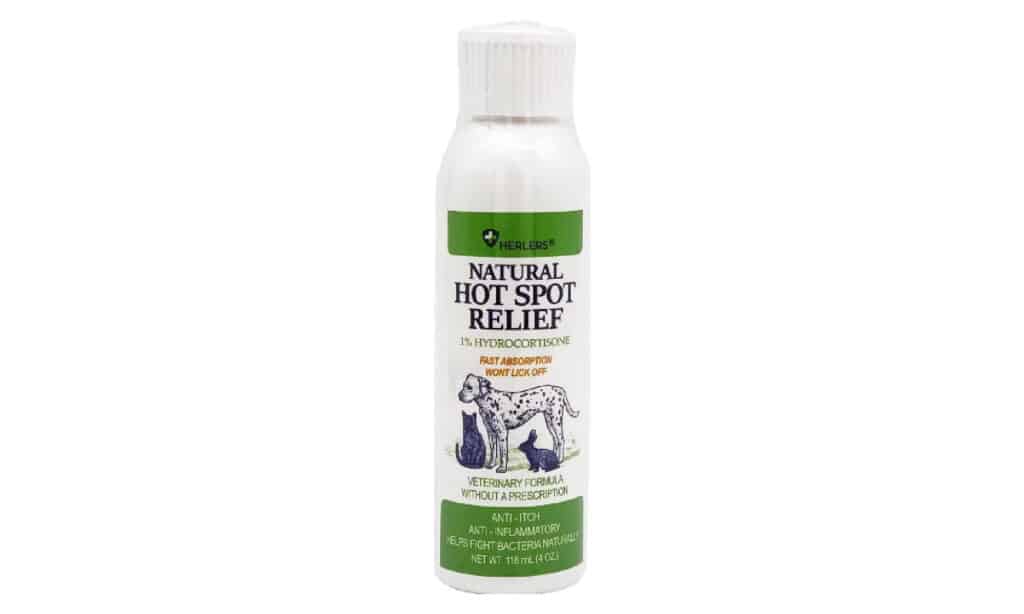
Healers Hot Spot Relief is a topical treatment designed to soothe and heal irritated skin on dogs.
Here are some basic facts about Quadruple so that you can compare and make the best selection for your situation.
What is Quadruple?
Quadruple Topical Ointment is a medicated ointment that is made by Covetrus. It’s generic name is Nystatin, Neomycin Sulfate, Thiostrepton, Triamcinolone Acetonide Ointment. This ointment is a topical veterinary ointment used as an antifungal, antibacterial, anti-inflammatory and antipruritic in dogs and cats.
Restrictions on Use: Veterinary pharmaceutical use in dogs and cats only.
Quadruple is available by prescription only.
What are all the generic and brand names for Quadruple?
Quadruple topical ointment is also known as; Derma-Vet Ointment, Dermalog, Quadritop, Quadruple, Generic Panalog, Dermavet, Med-Pharmex
What is Quadruple Ointment Used For?
FEATURES (From the manufacturer package insert): Quadruple Topical Ointment is useful in the treatment of:
- Local therapy in a variety of cutaneous disorders of cats and dogs
- Disorders caused, complicated, or threatened by bacterial and/ or candidal (monilial) infections
- Treatment of acute and chronic otitis of varied etiologies, in interdigital cysts in cats and dogs, and in anal gland infections in dogs
- Management of dermatologic disorders characterized by inflammation and dry or exudative dermatitis
The preparation is also indicated in the management of dermatologic disorders characterized by inflammation and dry or exudative dermatitis, particularly those caused, complicated, or threatened by bacterial or candidal (Candida albicans) infections.
It is also indicated in eczematous dermatitis, contact dermatitis, and seborrheic dermatitis, and for use as an adjunct in the treatment of dermatitis due to parasitic infection.
For gram-positive organisms, Thiostrepton has been shown to be effective. This includes antibiotic resistant organisms, gram-negative and gram-positive, and other antimicrobial actions. Combined, these treatments can assist in the treatment of bacterial infection that is superficial to prevent the organisms that are responsible.
Is Quadruple Ointment a Steroid?
Yes, Quadruple includes the ingredient of triamcinolone acetonide, which is a potent synthetic corticosteroid providing rapid and prolonged symptomatic relief on topical administration.
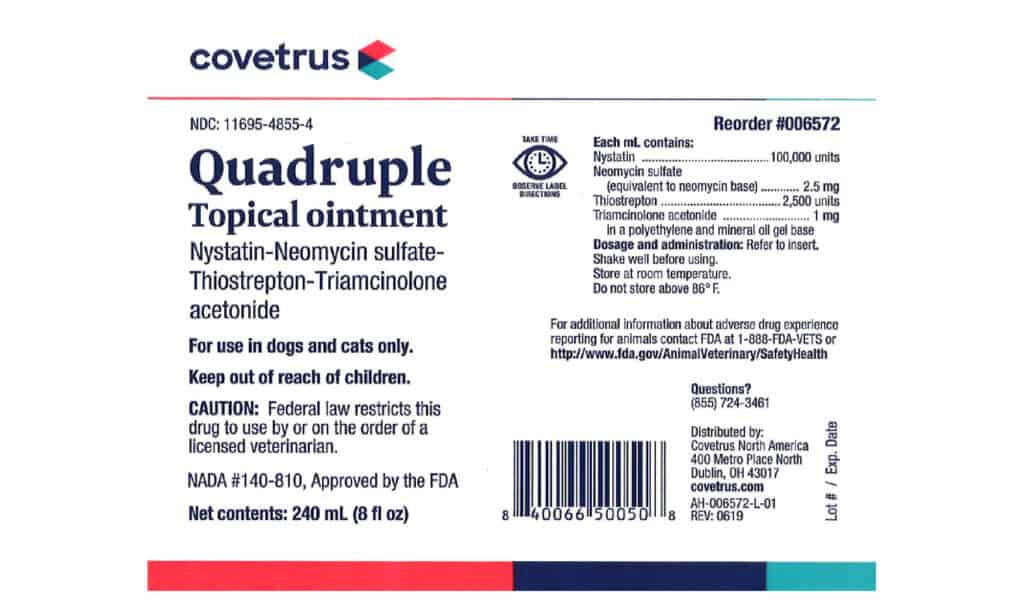
Quadruple Topical Ointment Side Effects
PRECAUTIONS (From the manufacturer package insert):
Nystatin, neomycin sulfate, thiostrepton, and triamcinolone acetonide ointment is not intended for the treatment of deep abscesses or deep-seated infections such as inflammation of the lymphatic vessels.
Nystatin, neomycin sulfate, thiostrepton, and triamcinolone acetonide ointment have been extremely well tolerated. Cutaneous reactions attributable to its use have been extremely rare. The occurrence of systemic reactions is rarely a problem with topical administration.
There is some evidence that corticosteroids can be absorbed after topical application and cause systemic effects. Therefore, an animal receiving nystatin, neomycin sulfate, thiostrepton, and triamcinolone acetonide ointment therapy should be observed closely for signs such as polydipsia, polyuria, and increased weight gain. Nystatin, neomycin sulfate, thiostrepton and triamcinolone acetonide ointment is not generally recommended for the treatment of deep or puncture wounds or serious burns.
Sensitivity to neomycin may occur. If redness, irritation or swelling persists or increases, discontinue use. Do not use if pus is present since the drug may allow the infection to spread. Keep this and all medications out of the reach of children.
SIDE EFFECTS (From the manufacturer package insert):
SAP and SGPT (ALT) enzyme elevations, polydipsia/polyuria, vomiting, and diarrhea (occasionally bloody) have been observed following parenteral or systemic use of synthetic corticosteroids in dogs. Cushing’s syndrome has been reported in association with prolonged or repeated steroid therapy in dogs.
Temporary hearing loss has been reported in conjunction with treatment of otitis with products containing corticosteroids. However, regression usually occurred following withdrawal of the drug. If hearing dysfunction is noted during the course of treatment with nystatin, neomycin sulfate, thiostrepton and triamcinolone acetonide ointment, discontinue its use.
CAUTION (From the manufacturer package insert):
Before instilling any medication into the ear, examine the external ear canal thoroughly to be certain the tympanic membrane is not ruptured in order to avoid the possibility of transmitting infection to the middle ear as well as damaging the cochlea or vestibular apparatus from prolonged contact. If hearing or vestibular dysfunction is noted during the course of treatment, discontinue the use of nystatin, neomycin sulfate, thiostrepton and triamcinolone acetonide ointment.
DOSAGE AND ADMINISTRATION (From the manufacturer package insert):
Frequency of administration is dependent on the severity of the condition. For mild inflammations, application may range from once daily to once a week; for severe conditions nystatin, neomycin sulfate, thiostrepton and triamcinolone acetonide ointment may be applied as often as two to three times daily, if necessary. Frequency of treatment may be decreased as improvement occurs.
Wear gloves during the administration of the ointment or wash hands immediately after application.
If you need help getting your dog’s recurrent infections under control, I recommend a food sensitivity stress test. Glacier Peak Holistics’ Pet Wellness Life Stress Scan is the one I use the most. After you order your dog’s Derma-Vet alternative, check out this review and info about this test to find the underlying cause of skin and ear issues.
Happy Healing!
